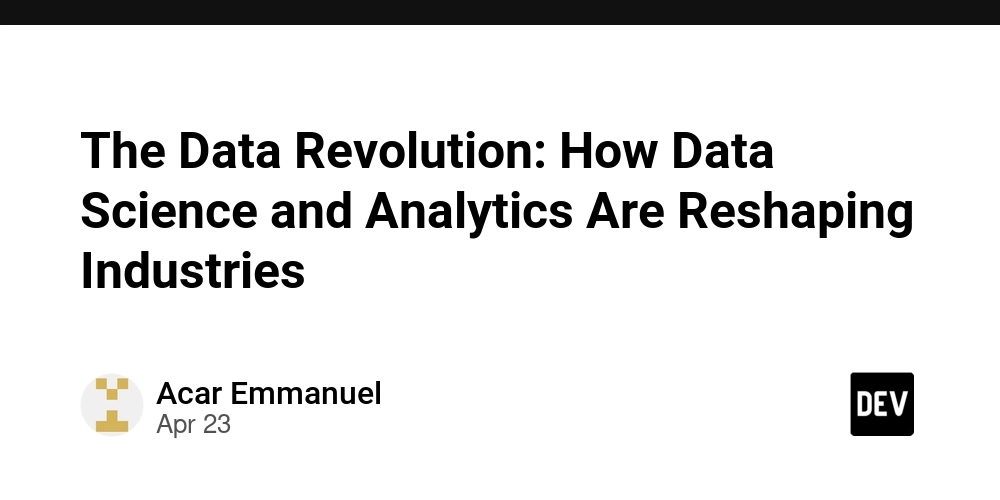The Data Revolution: How Data Science and Analytics Are Reshaping Industries
In today's highly-connected world, data is being generated at an unprecedented rate. But raw data alone holds little value. It's the ability to collect, process, and analyze this information – the realm of data science and analytics – that is proving truly transformative. These fields, combining statistics, computer science, and domain expertise, are moving beyond historical analysis to leverage tools like machine learning and AI, enabling businesses across sectors to unlock powerful insights, drive efficiency, and forge new paths for growth. The integration of data science and analytics is fundamentally changing how organizations operate: Informed Decision-Making: Gone are the days of relying solely on intuition. Businesses now use data analysis to gain concrete evidence about market trends, customer preferences, and operational performance, leading to more strategic and reliable decisions. Operational Efficiency: Identifying bottlenecks, optimizing supply chains, predicting maintenance needs, and streamlining resource allocation are key benefits. By analyzing operational data, companies can significantly reduce costs, minimize waste, and boost productivity.\ Enhanced Customer Understanding and Personalization: Analytics provides deep insights into customer behavior, needs, and purchase patterns. This allows businesses to tailor products, services, and marketing campaigns, creating personalized experiences that foster loyalty and drive sales. Examples like Amazon's recommendation engine highlight the power of this approach. Innovation and Competitive Edge: By analyzing market data, customer feedback, and emerging trends, companies can identify unmet needs, develop innovative products faster, and refine their strategies to stay ahead of the competition. Proactive Risk Management: Data analytics helps businesses anticipate and mitigate risks, from financial fraud detection and credit risk assessment to identifying potential operational disruptions or cybersecurity threats. Transformation Across the Board: Industry Examples The impact of data science and analytics is felt virtually across every industry: Healthcare: Predictive analytics helps forecast disease outbreaks, personalize treatment plans based on patient data (including genomics), optimize hospital resource allocation, and accelerate drug discovery. Finance: Banks and financial institutions use data science extensively for real-time fraud detection, algorithmic trading, credit risk assessment, and personalizing financial products for customers. Retail and E-commerce: Personalized recommendations, demand forecasting, optimized inventory management, dynamic pricing, and targeted marketing campaigns are now standard practice, driven by customer behavior analysis. Manufacturing: Predictive maintenance minimizes equipment downtime, quality control is enhanced through data analysis, and supply chains are optimized for efficiency, paving the way for smarter factories. Transportation and Logistics: Companies optimize delivery routes (like UPS's ORION system), manage traffic flow, predict demand fluctuations, and improve overall supply chain logistics using real-time data analysis. Energy: Data science aids in optimizing energy consumption, predicting equipment performance, managing smart grids, and improving the efficiency of renewable energy sources. The Way Forward Data science and analytics are no longer niche fields but core components of modern business strategy. As technologies like AI and machine learning continue to evolve, their ability to extract actionable insights from vast datasets will only grow. Businesses that effectively harness the power of data will be better positioned to innovate, adapt, enhance customer experiences, and ultimately thrive in the increasingly data-driven future.

In today's highly-connected world, data is being generated at an unprecedented rate. But raw data alone holds little value. It's the ability to collect, process, and analyze this information – the realm of data science and analytics – that is proving truly transformative. These fields, combining statistics, computer science, and domain expertise, are moving beyond historical analysis to leverage tools like machine learning and AI, enabling businesses across sectors to unlock powerful insights, drive efficiency, and forge new paths for growth.
The integration of data science and analytics is fundamentally changing how organizations operate:
Informed Decision-Making: Gone are the days of relying solely on intuition. Businesses now use data analysis to gain concrete evidence about market trends, customer preferences, and operational performance, leading to more strategic and reliable decisions.
Operational Efficiency: Identifying bottlenecks, optimizing supply chains, predicting maintenance needs, and streamlining resource allocation are key benefits. By analyzing operational data, companies can significantly reduce costs, minimize waste, and boost productivity.\
Enhanced Customer Understanding and Personalization: Analytics provides deep insights into customer behavior, needs, and purchase patterns. This allows businesses to tailor products, services, and marketing campaigns, creating personalized experiences that foster loyalty and drive sales. Examples like Amazon's recommendation engine highlight the power of this approach.
Innovation and Competitive Edge: By analyzing market data, customer feedback, and emerging trends, companies can identify unmet needs, develop innovative products faster, and refine their strategies to stay ahead of the competition.
Proactive Risk Management: Data analytics helps businesses anticipate and mitigate risks, from financial fraud detection and credit risk assessment to identifying potential operational disruptions or cybersecurity threats.
Transformation Across the Board: Industry Examples
The impact of data science and analytics is felt virtually across every industry:
Healthcare: Predictive analytics helps forecast disease outbreaks, personalize treatment plans based on patient data (including genomics), optimize hospital resource allocation, and accelerate drug discovery.
Finance: Banks and financial institutions use data science extensively for real-time fraud detection, algorithmic trading, credit risk assessment, and personalizing financial products for customers.
Retail and E-commerce: Personalized recommendations, demand forecasting, optimized inventory management, dynamic pricing, and targeted marketing campaigns are now standard practice, driven by customer behavior analysis.
Manufacturing: Predictive maintenance minimizes equipment downtime, quality control is enhanced through data analysis, and supply chains are optimized for efficiency, paving the way for smarter factories.
Transportation and Logistics: Companies optimize delivery routes (like UPS's ORION system), manage traffic flow, predict demand fluctuations, and improve overall supply chain logistics using real-time data analysis.
Energy: Data science aids in optimizing energy consumption, predicting equipment performance, managing smart grids, and improving the efficiency of renewable energy sources.
The Way Forward
Data science and analytics are no longer niche fields but core components of modern business strategy. As technologies like AI and machine learning continue to evolve, their ability to extract actionable insights from vast datasets will only grow. Businesses that effectively harness the power of data will be better positioned to innovate, adapt, enhance customer experiences, and ultimately thrive in the increasingly data-driven future.

















_NicoElNino_Alamy.png?width=1280&auto=webp&quality=80&disable=upscale#)

















































